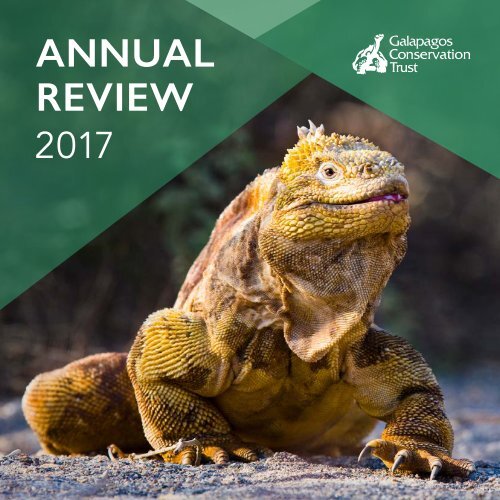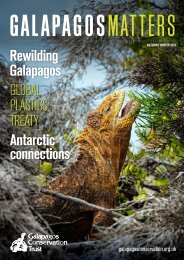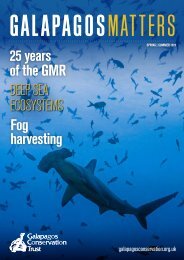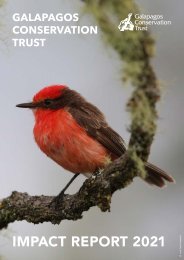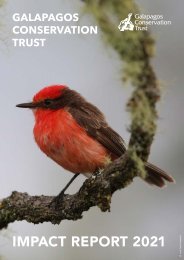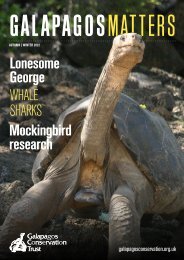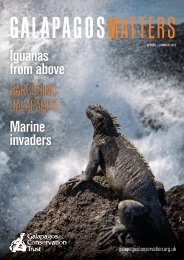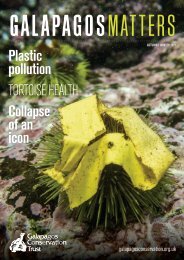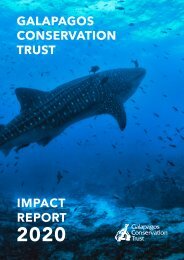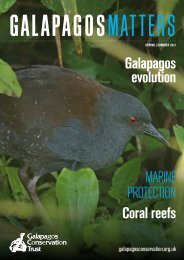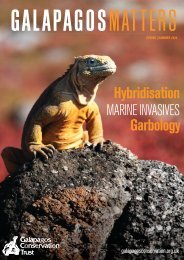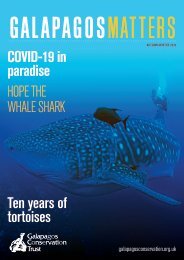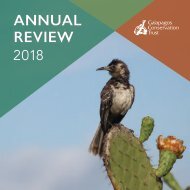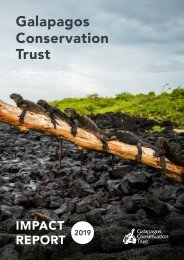Annual Review 2017 - Galapagos Conservation Trust
- No tags were found...
Create successful ePaper yourself
Turn your PDF publications into a flip-book with our unique Google optimized e-Paper software.
ANNUAL<br />
REVIEW<br />
<strong>2017</strong>
CHIEF EXECUTIVE’S OVERVIEW<br />
<strong>2017</strong> was another highly<br />
successful year for <strong>Galapagos</strong><br />
<strong>Conservation</strong> <strong>Trust</strong>. We<br />
launched our second<br />
flagship programme, Plastic<br />
Pollution Free <strong>Galapagos</strong>,<br />
which culminated with our<br />
<strong>Galapagos</strong> Day event where<br />
we brought together a panel<br />
of experts to help solve this<br />
issue in <strong>Galapagos</strong>. There have<br />
been significant changes since,<br />
with legislation introduced<br />
in <strong>Galapagos</strong> to ban a number of single-use plastic<br />
items. We are stepping up our work with local groups<br />
and the tourism industry to promote responsible use<br />
and alternatives to plastic, which you can read more<br />
about on page 7.<br />
We continued to support conservation breakthroughs<br />
in our Science & <strong>Conservation</strong> work, including the first<br />
ever wild whale shark ultrasound and the pioneering<br />
study on sex ratios of wild giant tortoise hatchlings.<br />
We also launched our <strong>Galapagos</strong> Land Iguana project,<br />
with the long term aim of reintroducing this species to<br />
Santiago island.<br />
I am delighted to report our overall expenditure on<br />
charitable activities rose by 25% in <strong>2017</strong>, enabling us<br />
to achieve even greater impact. We are immensely<br />
grateful for the support from our dedicated supporters,<br />
partners, staff and Board, which is vital for us to ensure<br />
a sustainable future for these unique Islands.<br />
Sharon Johnson, Chief Executive<br />
<strong>Galapagos</strong> <strong>Conservation</strong> <strong>Trust</strong><br />
Who we are<br />
<strong>Galapagos</strong> <strong>Conservation</strong> <strong>Trust</strong> is the only UK charity<br />
focussed solely on the conservation of one of the most<br />
unique and ecologically important areas in the world,<br />
the <strong>Galapagos</strong> Islands.<br />
With over 20 years of experience, we partner with<br />
Ecuadorian authorities, NGOs, local communities and<br />
leading researchers to support impactful Science &<br />
<strong>Conservation</strong> programmes and deliver community<br />
outreach across the Archipelago through our Education<br />
& Sustainability programme.<br />
Our team<br />
Sharon Johnson, Chief Executive<br />
Jen Jones, Projects Manager<br />
Lisa Wheeler, Office Manager<br />
Clare Simm, Communications & Membership Manager<br />
Stephanie Strutt, <strong>Trust</strong>s Fundraising Manager<br />
Kelly Hague, Individual Giving Manager<br />
Alice Marks, <strong>Trust</strong>s Fundraising Officer<br />
Ben Stockwell, Communications & Membership Officer<br />
Beth Byrne, Office Assistant<br />
Andy Donnelly, Flagship Programmes<br />
Anne Guezou, Outreach Coordinator in <strong>Galapagos</strong><br />
Sarah Langford, Education Writer<br />
Our trustees<br />
Mark Collins (Chair), Jonathan Lea (Treasurer), Simon<br />
Dickson, Michael Drake, Rebecca Nesbit, Marta Tufet.<br />
Our project partners<br />
Charles Darwin Foundation, Durrell Wildlife <strong>Conservation</strong><br />
<strong>Trust</strong>, Ecology Project International, <strong>Galapagos</strong><br />
Conservancy, <strong>Galapagos</strong> Science Center, <strong>Galapagos</strong><br />
National Park, <strong>Galapagos</strong> Tortoise Movement Ecology<br />
Programme, <strong>Galapagos</strong> Whale Shark Project, Grupo<br />
Eco Cultural Organizado, Island <strong>Conservation</strong>, Massey<br />
University, Scalesia Foundation.<br />
<strong>Annual</strong> <strong>Review</strong> <strong>2017</strong><br />
<strong>Galapagos</strong> <strong>Conservation</strong> <strong>Trust</strong><br />
Page 2
OUR SUPPORTERS<br />
We would like to extend our most sincere thanks to all of our supporters and partners who<br />
have helped us protect the Enchanted Isles in <strong>2017</strong>.<br />
© Simon Pierce<br />
Support of £10,000 and over<br />
Altitude London<br />
The Bromley <strong>Trust</strong><br />
The Ernest Kleinwort<br />
Charitable <strong>Trust</strong><br />
Evolution Education<br />
<strong>Trust</strong><br />
H D H Wills 1965<br />
Charitable <strong>Trust</strong><br />
Ken Collins and Jenny<br />
Mallinson<br />
New Chapters UK<br />
The Sackler <strong>Trust</strong><br />
Support of £1,000 and over<br />
The Woodspring <strong>Trust</strong><br />
Accentus Foundation, The Catatania <strong>Trust</strong>, Decroom<br />
Ltd, Dennis Curry’s Charitable <strong>Trust</strong>, Michael Drake,<br />
Ian Dunn, Ennismore Foundation, Jennifer Evans, The<br />
GESS Charitable <strong>Trust</strong>, Go Barefoot Travel, John and<br />
Marion Green, Claire Halpin, Haugan Cruises, The<br />
Holbeck Charitable <strong>Trust</strong>, IWC Schaffhausen, Langdale<br />
<strong>Trust</strong>, Spiro and Dorothy Latsis, Mark and Liza Loveday,<br />
Guy Marks, Metro Broadcast, Metropolitan Touring,<br />
Peregrine Moncreiffe, National Marine Aquarium,<br />
Barry and Ann Phillips, Michael Prater, Sarah Reynolds,<br />
Rutherford <strong>Trust</strong>, Sculpt the Future Foundation, Anthony<br />
Smith Sculpture, Christopher Spooner, Steppes Travel,<br />
Jennifer Stone, Think <strong>Galapagos</strong>, Travel Matters,<br />
University of Essex.<br />
<strong>Galapagos</strong> Guardians<br />
Geoffrey Ball, Csaba Barta, Edward and Sally Benthall,<br />
David and Rosalind Cleevely, Olivia Cleevely and Martin<br />
Edge, Jeremy Coller, Tim and Catherine Cox, Annie<br />
Coxon, Paul and Jill Davis, Christine Edwards, Penelope<br />
Eve, Barbara and Patrick Gallagher, Nicholas and Judith<br />
Goodison, David Girling, Claire Halpin, Sue Henning,<br />
Daniel Hochberg, Mavis Hughes, Roderick and Elizabeth<br />
Jack, Margaret Jackson, Robin and Diana Jakeways,<br />
Chris John, Carol Kemm, Darren Leftwich, Mark and<br />
Liza Loveday, Carolyn Michie, Renate Nahum, Barry and<br />
Ann Phillips, Julian Ranger, Sarah Reynolds, Michael and<br />
Barbara Saville, David and Katherine Soanes, Christopher<br />
Spooner, Nicholas Spooner, Thomas Spooner, Jennifer<br />
Stone, Catherine Thomas, Andrew Thompson, Jane Tozer,<br />
Edmund Truell, Jim Wheeler, Camilla Williams, David<br />
Wiltshire, John and Jill Woodley.<br />
Ambassadors<br />
Monty Halls (President), Janet Barber, James Barlow,<br />
Liz Bonnin, Sarah Darwin, Angela Darwin, Julian Fitter,<br />
Stanley Johnson, Randal Keynes, Dorothy Latsis, Godfrey<br />
Merlen, Henry Nicholls, Jonathan and Angela Scott, Antje<br />
Steinfurth, Jennifer Stone, Ian Swingland.<br />
Page 3<br />
galapagosconservation.org.uk<br />
+44 (0)20 7399 7440<br />
© Simon Pierce
SCIENCE & CONSERVATION<br />
Our support for Science & <strong>Conservation</strong> work on the Islands continued throughout <strong>2017</strong>,<br />
helping to ensure a future for the incredible ecosystems and unique biodiversity of <strong>Galapagos</strong>.<br />
Land Iguana Project<br />
Launched in <strong>2017</strong> and led by Luis Ortiz-Catedral, this<br />
project aims to re-assess the species’ IUCN Red List<br />
status which has not been reviewed for over 20 years.<br />
80% of land iguana populations appear to be heavily<br />
affected by feral cat predation and there has been little<br />
or no records of young iguanas surviving into adulthood.<br />
This project will highlight the current health status of the<br />
species and look at potential re-introduction sites around<br />
Santiago island where they have been extinct since the<br />
early 20th century. In <strong>2017</strong>, the team tagged over 150<br />
iguanas in three populations, including the smallest land<br />
iguana recorded in the last 10 years on top of Fernandina<br />
island – measuring just 14cm.<br />
<strong>Galapagos</strong> Whale Shark Project<br />
In order to provide effective protection to whale sharks<br />
throughout their life, we need to understand their<br />
migratory routes and key life stages. This project, started<br />
in 2011, is collecting important data to help inform the<br />
conservation of this endangered species. In <strong>2017</strong>, the<br />
team led by Jonathan Green and Alex Hearn, tagged<br />
20 whale sharks, of which seven were new to the global<br />
whale shark database.<br />
A major achievement in <strong>2017</strong> was conducting the first<br />
ever wild whale shark ultrasound and taking blood<br />
samples. The results of this will confirm, for certain,<br />
whether or not this whale shark is pregnant – a significant<br />
milestone for this project and the species’ conservation.<br />
<strong>Galapagos</strong> Tortoise Movement<br />
Ecology Programme<br />
Since 2009, the <strong>Galapagos</strong> Tortoise Movement Ecology<br />
Programme (GTMEP) led by Stephen Blake with partners<br />
including the Charles Darwin Foundation and the <strong>Galapagos</strong><br />
National Park, has provided critical insights for developing<br />
robust conservation strategies for giant tortoises through<br />
research into migration, nesting, sex ratios and early years’<br />
survival.<br />
In <strong>2017</strong>, the team undertook a third season of tortoise<br />
nest surveys with 67 nests monitored on Santa Cruz<br />
and the first ever study on sex ratios of wild hatchlings.<br />
New for <strong>2017</strong> was the survey of a recently discovered<br />
population of tortoises at Cerro Fatal on Santa Cruz. The<br />
project also launched a study of tortoise-farm interactions<br />
to feed into land use planning.<br />
GCT’s outreach coordinator Anne Guezou, took one<br />
hundred children on tracking surveys in the <strong>Galapagos</strong><br />
National Park and created a science communication club<br />
for teenagers on the Islands. We also organised a World<br />
Turtle Day event in May for around 270 children.<br />
© GTMEP; Neil Bruce; GWSP<br />
<strong>Annual</strong> <strong>Review</strong> <strong>2017</strong><br />
<strong>Galapagos</strong> <strong>Conservation</strong> <strong>Trust</strong><br />
Page 4
EDUCATION & SUSTAINABILITY<br />
Our Education & Sustainability work continued to strengthen in <strong>2017</strong>, delivering community<br />
outreach across the Archipelago and increasing education activities in the UK and Ecuador.<br />
Plastic-free <strong>Galapagos</strong> – Grupo Eco Cultural<br />
Organizado (GECO)<br />
GCT has been working alongside GECO, a local youth<br />
campaign group that promotes a culture of responsible<br />
plastic usage on San Cristobal island. In <strong>2017</strong> GECO<br />
spread their message directly to 2,000 people and a<br />
further 3,000 indirectly – around half the total population<br />
of San Cristobal.<br />
© GECO; Adrian Vasquez<br />
Their success is due to the creation of a dedicated team of<br />
15 young ‘agents of change for less plastic’, who helped<br />
deliver over 30 responsible plastic usage workshops with<br />
local communities and school groups. GECO successfully<br />
extended the campaign to several local businesses<br />
including shops and restaurants and has solidified a<br />
network of 53 citizens to clean up rubbish on a daily basis<br />
in San Cristobal - preventing more than an estimated 5000<br />
pieces of litter entering the ocean.<br />
Discovering <strong>Galapagos</strong><br />
Our Discovering <strong>Galapagos</strong> programme is continuing<br />
to go from strength to strength with the average website<br />
visitors increasing to over 3,500 per month on the UK site<br />
and 9,000 per month on the Ecuadorian site.<br />
Discovering <strong>Galapagos</strong> teacher resource downloads<br />
are now around 600 per month with a further 300 per<br />
month on the Times Educational Supplement website.<br />
Furthermore, a GCSE case study was developed in<br />
partnership with Royal Geographical Society and has<br />
been linked to UK exam boards. <strong>2017</strong> also saw us develop<br />
Spanish language teaching resources to link to the<br />
Ecuadorian curriculum.<br />
Bullhead Shark Project<br />
In addition to an excellent year surveying bullhead<br />
sharks in <strong>Galapagos</strong>, the team organised their Shark<br />
Day on the Islands. Supported by GCT, they put<br />
together a selection of educational activities for 65<br />
children and their families to take part in.<br />
This was an excellent engagement activity for local<br />
community members to learn about the sharks of<br />
<strong>Galapagos</strong>, including their importance in a healthy<br />
marine ecosystem and how we can conserve them<br />
in the future.<br />
Page 5<br />
galapagosconservation.org.uk<br />
+44 (0)20 7399 7440
FLAGSHIP PROGRAMMES<br />
As part of our long-term, measured approach to projects we have developed two flagship<br />
programmes - Restoring Floreana and Plastic Pollution Free <strong>Galapagos</strong>.<br />
Restoring Floreana<br />
In 2016 we launched our first multi-year, flagship<br />
programme, to support the restoration of Floreana.<br />
As the sixth largest island in <strong>Galapagos</strong>, Floreana used<br />
to be home to some of the most iconic species in the<br />
Archipelago, including the Floreana mockingbird, racer<br />
snake and giant tortoise. Today, however, 55 of its<br />
species are listed as endangered and a further two as<br />
critically endangered – primarily due to the introduction<br />
of invasive species.<br />
© Jen Jones<br />
This long term project, led by Island <strong>Conservation</strong><br />
and the <strong>Galapagos</strong> National Park, seeks to make<br />
Floreana the first large, inhabited island to achieve full<br />
eradication of invasive mammals, with the ultimate goal<br />
of reintroducing the locally extinct Floreana mockingbird<br />
and racer, which have small populations on nearby<br />
Champion and Gardner islets.<br />
In <strong>2017</strong> the project made significant progress working<br />
alongside local residents to develop management<br />
plans for livestock during and after the baiting phase<br />
of the project. The eradication of rats will benefit<br />
local farmers as rats decimate crops and eat food for<br />
livestock. A workshop was also held with Durrell Wildlife<br />
<strong>Conservation</strong> <strong>Trust</strong> to discuss the necessary mitigation<br />
plans to ensure that local wildlife is not impacted during<br />
the baiting phase.<br />
© Luis Ortiz-Catedral<br />
The populations of both Floreana mockingbirds and<br />
racers were monitored throughout the year by Luis<br />
Ortiz-Catedral’s team - providing crucial data for<br />
future reintroduction plans. The team also carried out<br />
vegetation mapping on Champion islet, which will help<br />
us understand the habitat requirements of Floreana<br />
mockingbirds prior to their reintroduction.<br />
<strong>Annual</strong> <strong>Review</strong> <strong>2017</strong><br />
<strong>Galapagos</strong> <strong>Conservation</strong> <strong>Trust</strong><br />
Page 6
© Nina Sletmo<br />
Plastic Pollution Free <strong>Galapagos</strong><br />
In late <strong>2017</strong>, we brought together a panel of<br />
experts for our <strong>Galapagos</strong> Day event to discuss<br />
the issue of plastic pollution in <strong>Galapagos</strong>. The<br />
collaborative, multi-disciplinary knowledge of the<br />
panelists informed planning for our 2018 plastics<br />
workshop, which will kick start the science and<br />
conservation strand of the programme. In 2018, we are<br />
also working with partners, including the <strong>Galapagos</strong><br />
National Park and the <strong>Galapagos</strong> Science Center, to<br />
develop a five-year management strategy to make<br />
<strong>Galapagos</strong> plastic pollution free.<br />
© Stephanie Foote<br />
Plastic pollution is one of the most pressing issues<br />
facing marine wildlife worldwide and whilst <strong>Galapagos</strong><br />
remains relatively pristine, sadly it is not exempt from<br />
this problem. Plastic is regularly found in the <strong>Galapagos</strong><br />
Marine Reserve and is posing a threat to the unique<br />
biodiversity of the Archipelago. In fact, at least<br />
18 species have been recorded either entangled by<br />
plastic, or to have ingested it.<br />
In <strong>2017</strong>, we launched our second long-term and ambitious<br />
programme that will combine groundbreaking scientific<br />
research with coordinated education and outreach to<br />
make <strong>Galapagos</strong> plastic pollution free once again.<br />
Over the past year we have worked alongside the local<br />
youth group, Grupo Eco Cultural Organizado (GECO),<br />
who have promoted responsible plastic usage on San<br />
Cristobal island through workshops and innovative<br />
education activities. The results have been promising,<br />
with an incredible 97% of surveyed participants sharing<br />
the campaign messages with their families and friends.<br />
We also supported pilot beach and street surveys on<br />
San Cristobal island, allowing us to set methodologies<br />
for future surveys.<br />
Tourism Strategic Plan <strong>2017</strong>-2020<br />
Our tourism strategy got underway with the<br />
launch of our ‘Inside <strong>Galapagos</strong>’ responsible<br />
tourism leaflet in early <strong>2017</strong>. The leaflet is a key<br />
part of our goal to inform visitors to the Islands<br />
about responsible plastic usage and adhering to<br />
<strong>Galapagos</strong> National Park rules.<br />
In 2018, we are holding a plastics workshop,<br />
supported by the Latin American Travel<br />
Association (LATA), for the UK tourism industry<br />
to look at how we can further work together to<br />
reduce plastic pollution on the Islands.<br />
Page 7<br />
galapagosconservation.org.uk<br />
+44 (0)20 7399 7440
SOME KEY HIGHLIGHTS FROM <strong>2017</strong><br />
SCIENCE & CONSERVATION<br />
EDUCATION & SUSTAINABILITY<br />
6<br />
<strong>Annual</strong> <strong>Review</strong> <strong>2017</strong><br />
<strong>Galapagos</strong> <strong>Conservation</strong> <strong>Trust</strong><br />
Page 8
HOW TO GET INVOLVED IN OUR WORK<br />
Become a member.<br />
Our members underpin our work –<br />
without your support and funds,<br />
we couldn’t continue to<br />
conserve the Islands.<br />
Enter our annual<br />
photography competition.<br />
Fun for you, and your images<br />
will help us promote the<br />
beauty of <strong>Galapagos</strong>.<br />
Enter our raffle.<br />
This brings in important<br />
funding and you could win an<br />
amazing prize such as the trip of<br />
a lifetime to <strong>Galapagos</strong>.<br />
Join a bespoke GCT cruise.<br />
Not only will you have a unique<br />
experience, you will also<br />
help fund our important<br />
conservation work.<br />
To find out more about these<br />
and other ways you can help,<br />
please visit our website<br />
galapagosconservation.org.uk,<br />
sign up to our monthly e-News or<br />
follow us on social media.<br />
Leave a legacy.<br />
A comforting and meaningful<br />
way to support our conservation<br />
work. The legacies we receive<br />
help us enormously.<br />
Adopt a <strong>Galapagos</strong> animal.<br />
For you or as a present for someone.<br />
Something different whilst being<br />
extremely helpful to our work.<br />
Donate.<br />
However big or small,<br />
donations enable the impact<br />
of our work to grow.<br />
Attend an event.<br />
Get inspired at our talks<br />
and events, and meet others<br />
passionate about <strong>Galapagos</strong>.<br />
Page 9<br />
galapagosconservation.org.uk<br />
+44 (0)20 7399 7440
FINANCIAL REVIEW<br />
Overall income for the charity was £667,745 in <strong>2017</strong>.<br />
This compares to £883,904 in 2016 when we were<br />
grateful to receive a significant legacy of £366,504 from<br />
the late Mrs Janet Knell. Excluding this legacy, income<br />
increased by £150,345 or 29% in <strong>2017</strong> compared to<br />
2016, largely due to an increase in individual donations,<br />
many of which were restricted.<br />
We were able to increase our expenditure on charitable<br />
activities to £567,722, an increase of 25% from the previous<br />
year of £453,755. Expenditure on our two main programmes<br />
was £304,254 on Science & <strong>Conservation</strong> and £263,468 on<br />
Education & Sustainability.<br />
Expenditure on raising funds decreased slightly to £110,508<br />
in <strong>2017</strong> from £119,051 the previous year.<br />
Statement of Financial Activities<br />
For year ended 31 December <strong>2017</strong><br />
Income:<br />
Unrestricted<br />
Funds £<br />
Restricted<br />
Funds £<br />
Total<br />
<strong>2017</strong> £<br />
Total<br />
2016 £<br />
Donations and legacies 115,286 330,932 446,218 641,350<br />
Charitable activities 118,923 - 118,923 113,943<br />
Other trading activities 70,626 31,548 102,174 127,542<br />
Investment income 430 - 430 1,069<br />
Total income 305,265 362,480 667,745 883,904<br />
Expenditure:<br />
Raising funds 110,508 - 110,508 119,051<br />
Charitable activities 190,145 377,577 567,722 453,755<br />
Total expenditure 300,653 377,577 678,230 572,806<br />
Net income/<br />
(expenditure) 4,612 (15,097) (10,485) 311,098<br />
Transfers (35,765) 35,765<br />
Net movement in funds (31,153) 20,668 (10,485) 311,098<br />
Reconciliation of funds:<br />
Total funds brought forward 583,636 92,246 675,882 364,784<br />
Total funds carried forward 552,483 112,914 665,397 675,882<br />
<strong>Annual</strong> <strong>Review</strong> <strong>2017</strong><br />
<strong>Galapagos</strong> <strong>Conservation</strong> <strong>Trust</strong><br />
Page 10
Balance Sheet<br />
For year ended 31 December <strong>2017</strong> <strong>2017</strong> £ 2016 £<br />
Events, appeals<br />
and trading<br />
Donations<br />
Fixed assets:<br />
Tangible fixed assets 2,688 2,229<br />
Memberships<br />
15%<br />
Current assets:<br />
Debtors 29,198 30,767<br />
Cash and bank 657,053 649,446<br />
Liabilities:<br />
Creditors: amounts falling due within one year (23,542) (6,560)<br />
18%<br />
Total<br />
income in<br />
<strong>2017</strong><br />
59%<br />
Net current assets / (liabilities) 662,709 673,653<br />
7%<br />
Total net assets 665,397 675,882<br />
Funds:<br />
Restricted funds 112,914 92,246<br />
Gift aid<br />
Legacies<br />
1%<br />
Unrestricted funds<br />
Designated funds 364,235 400,000<br />
General funds 188,248 183,636<br />
Raising<br />
funds<br />
16%<br />
Science &<br />
<strong>Conservation</strong><br />
Total funds 665,397 675,609<br />
Reserves<br />
As planned we ended the year with a small deficit of £10,485<br />
(2016: £311,098 surplus). At 31 December <strong>2017</strong> we carried<br />
forward total reserves of £665,397 of which £112,914 are in<br />
restricted funds. The <strong>Trust</strong>ees have designated funds totalling<br />
£364,235 to the two main programmes, Science & <strong>Conservation</strong><br />
and Education & Sustainability, while unrestricted general funds<br />
stood at £188,248, which is in line with our reserves policy.<br />
Education &<br />
Sustainability<br />
39%<br />
39%<br />
Total<br />
expenditure<br />
in <strong>2017</strong><br />
45%<br />
These financial statements are a summary of information extracted from the full financial<br />
statements. The full report and accounts were approved by the <strong>Trust</strong>ees on 18 June 2018 and<br />
have been submitted to the Charity Commissioner and Registrar of Companies. These summarised<br />
financial statements may not contain sufficient information to allow for a full understanding of the<br />
financial affairs of <strong>Galapagos</strong> <strong>Conservation</strong> <strong>Trust</strong>. For further information, the full annual accounts,<br />
the independent examiner’s report on these accounts and the <strong>Trust</strong>ees’ annual report should be<br />
consulted. Copies of these can be obtained from <strong>Galapagos</strong> <strong>Conservation</strong> <strong>Trust</strong>, 28 Portland Place,<br />
London, W1B 1LY, UK, by email at gct@gct.org or by phone on 020 7399 7440.<br />
Independent Examiner:<br />
Wilkins Kennedy LLP<br />
Bridge House<br />
London, SE1 9QR<br />
Bankers<br />
Lloyds Bank plc<br />
1 Legg Street<br />
Essex<br />
CM1 1JS<br />
CAF Bank Ltd<br />
Kings Hill<br />
West Malling<br />
Kent<br />
ME19 4TA<br />
Approved by the Board and signed on its behalf by: Mark Collins and Jonathan Lea, 18 June 2018.<br />
Page 11<br />
galapagosconservation.org.uk<br />
+44 (0)20 7399 7440
<strong>Galapagos</strong> <strong>Conservation</strong> <strong>Trust</strong><br />
Charles Darwin Suite<br />
28 Portland Place<br />
London<br />
W1B 1LY<br />
galapagosconservation.org.uk<br />
+44 (0)20 7399 7440<br />
gct@gct.org<br />
Registered Charity No. 1043470<br />
Printed on sustainably sourced paper.<br />
Cover image: Land iguana © Claude Lester


